Shocking child sexual abuse map reveals NSW suburbs with highest rates
NSW suburbs with the highest and lowest rates of reported child sexual abuse have been revealed and they highlight a huge double standard. Warning: Distressing
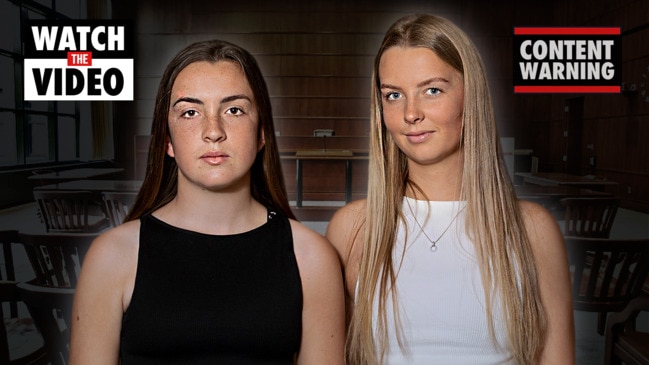
EXCLUSIVE
On Monday, two brave sexual abuse survivors Pippa and Rose Milthorpe from Albury, NSW, spoke out about the lack of support for child victims in regional communities.
Now, an exclusive deep dive investigation by news.com.au into the most recent Bureau of Crime Statistics and Research (BOCSAR) crime data has revealed an alarming trend in NSW.
Justice shouldn’t hurt, but for children in Australia, it does. The NSW government knows how to fix this problem, but has failed to do so. That’s why news.com.au is calling for law reform to make it easier for child victims of sexual abuse to give evidence. Join the movement and sign the petition here.
Headline figures include that:
• The top 30 ranking Local Government Areas (LGAs) with the highest rates of child sexual abuse per capita were all located in regional, rural or remote areas.
• 39 out of 40 LGAs ranked with the highest rate of child sexual abuse per capita were located in regional, rural or remote areas. Only one was classified as metropolitan (Sydney CBD, placed 36).
• Of the 10 LGAs with the lowest ranking rates of child sexual abuse per capita, nine were located in metropolitan Sydney, including Mosman, North Sydney, Lane Cove, Canada Bay and Strathfield. The one exception was Yass Valley.
• Children in Kempsey located on the North coast of NSW were almost 10 times more likely to have reported sexual abuse in the last year, compared to those who live in Strathfield.
In the 12 months leading up to June 2022, a total of 9301 children reported to NSW police as a victim of a sexual offence.
A heat map of where those alleged crimes occurred – represented in terms of per capita risk – clearly demonstrates that children in rural and remote areas face far higher rates of sexual abuse, compared to their metropolitan counterparts.
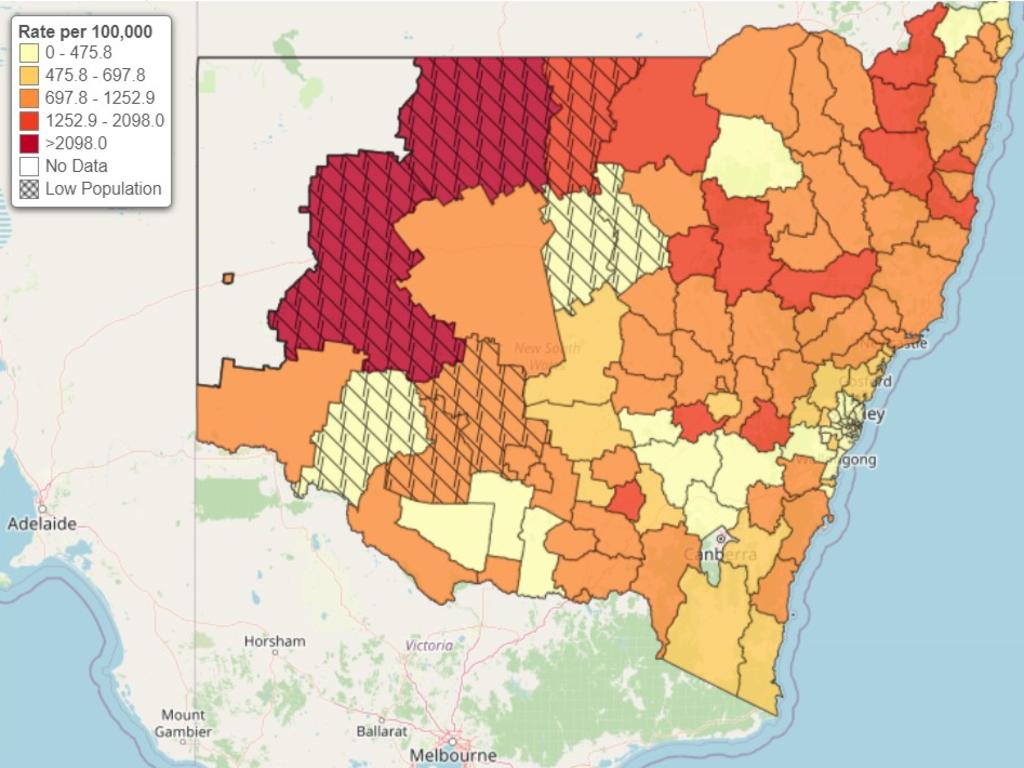
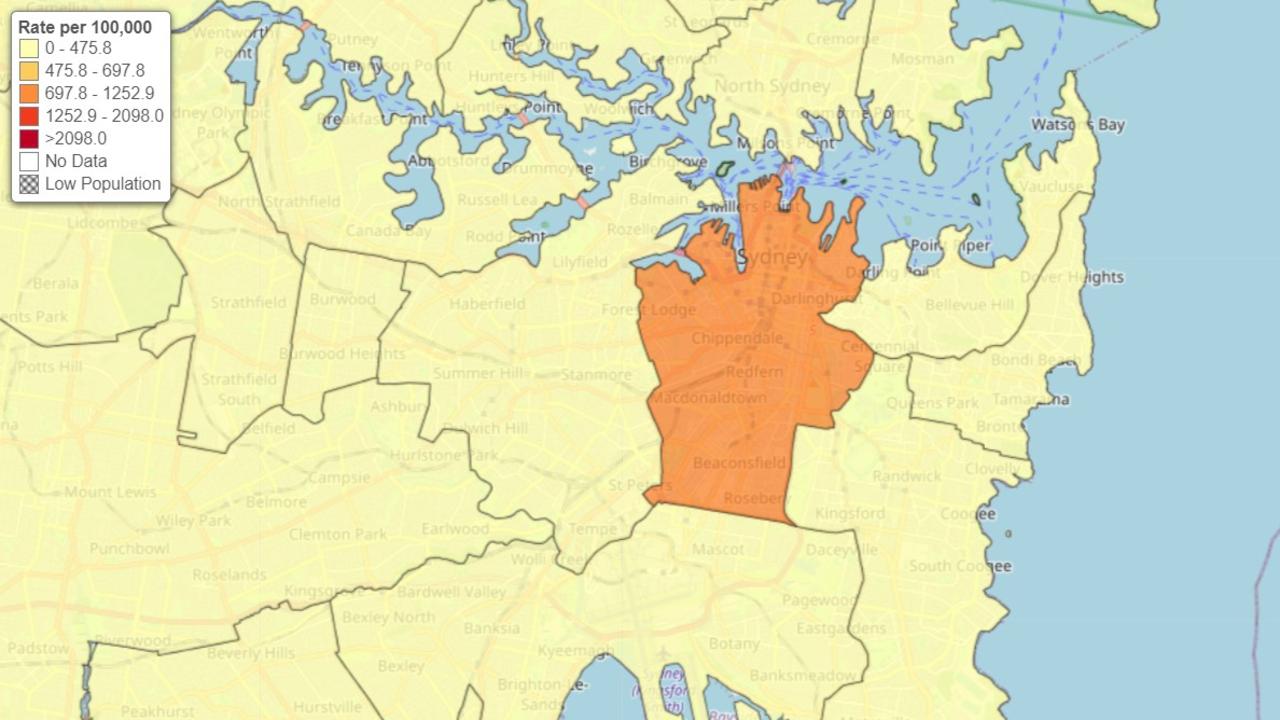
‘It shouldn’t be a postcode lottery’
The heat map confirms what experts have been saying for years: that sexual abuse against children can happen anywhere, but children located in regional, rural and remote areas face much higher victimisation rates.
Yet paradoxically, only metropolitan children located in Sydney and Newcastle are able to access the Child Sexual Offence Evidence Program – designed to assist children who have experienced sexual abuse when giving evidence in court.
For all other children – particularly those in regional and remote areas – they are left without.
It’s a cruel double standard which means that some of the children who are most at risk of experiencing sexual abuse are now hit with the double-disadvantage of then being least able to access justice support.
Alarmingly, according to BOCSAR data, since the program’s launch six years ago, a further 59,072 children have reported being sexually abused to NSW police. Tragically, this equates to an average of 27 new reports per day.
And only a fraction of those reports, 4.1 per cent (or 2428), came from children in the Sydney or Newcastle LGA where the program operates.
The disparity in access to the program has been labelled a gross double standard by experts and survivors alike.
“The program should not be regionally restricted,” says Professor Judith Cashmore AO, who evaluated the program in 2017.
“It shouldn’t be a postcode lottery as to whether you have access. It is an equity issue that children across NSW who need it, should have access to it.”
Professor Cashmore’s independent evaluation found that the program was highly valued by all involved, and was reducing rates of trauma for children giving evidence.
We want to make a change
Sisters Rose, 14, and Pippa, 17, two sexual abuse survivors from Albury NSW, have set up a petition with their parents, calling for the program to be rolled out consistently across the entire state.
Both sisters were deemed ineligible for the program when they gave evidence in court in 2016. The trial left them both traumatised, something which they are determined to change for other children.
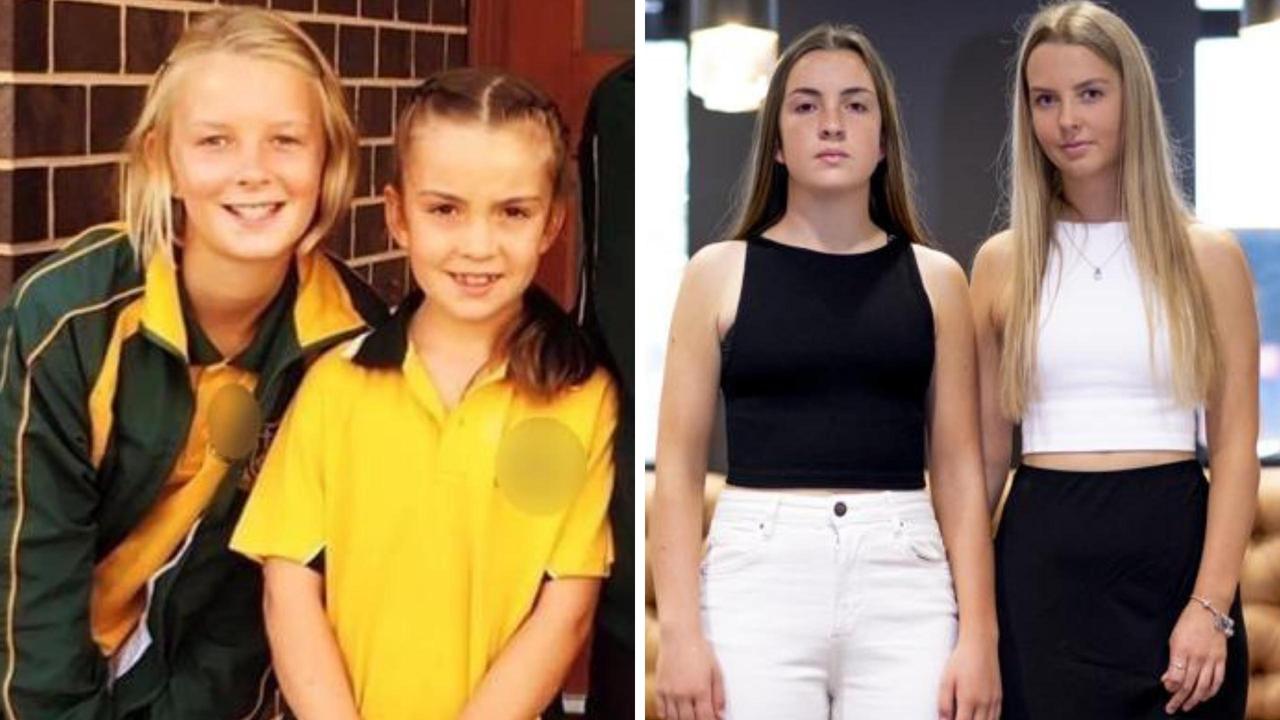
“We live in a rural community, we live in a small town, so we don’t really have access to certain services,” Pippa says, whose offender was found guilty of six counts of aggravated indecent assault in 2016.
“Obviously a lot of people in New South Wales don’t live in the cities. It’s an injustice in itself not being available for everyone. So we think it’s important that it gets to every corner of New South Wales.”
Albury ranked 27 on the list of top 30 LGAs with the highest rates of reported child sexual abuse per capita in 2022. In the six years since the program was introduced, a total of 619 children in Albury have reported sexual abuse to the police. The town’s total population is just 56,000.
Join the movement and sign the petition here.
In September Pippa and her sister Rose, 14, travelled from Albury to Sydney to personally deliver a handwritten note to the Attorney-General, Mark Speakman. It read:
We know that the [program] exists and we believe it is truly a huge step forward. We believe this [program] should be available for all children in NSW, not just the metro kids. This being unavailable for regional kids is unjust.
Why are you allowing some children to continue being traumatised by a process that you are the head of? We ask that you make this pilot program available to all children in NSW- help them to try to get some justice by providing them with the opportunity to give evidence in a safe and supported environment that recognises that they are children and helps them all start their healing journey sooner.
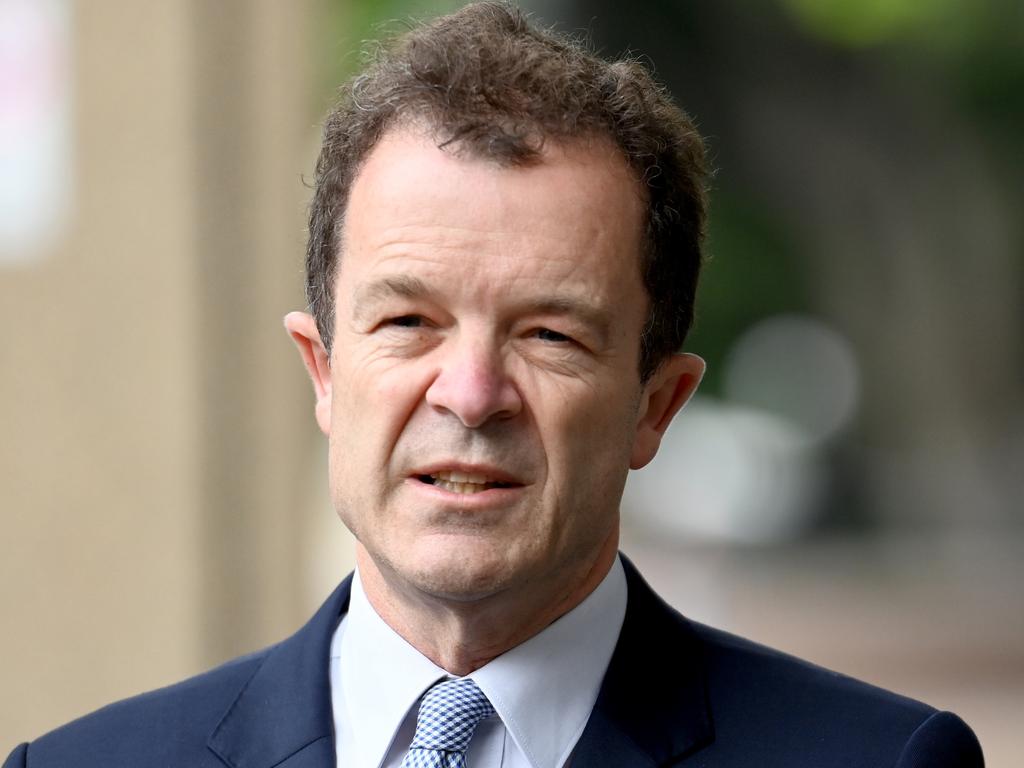
The Attorney-General, Mark Speakman, responded but there was no indication that the program would be rolled out further.
Michelle Milthorpe, the mother of Pippa and Rose, says that this is only one of the many challenges which survivors in regional communities face.
Confidentiality and privacy have been key concerns from the day the sisters first reported.
“Everyone who knows in our town has been very supportive of the girls, but we didn’t always get to control who found out,” Michelle says.
“The police officer who came to our house on the first day used to play football with Brent [my husband].”
The sexual assault counselling service the girls visited was also co-located at the community health centre, where other staff recognised the sisters.
“It’s the same place we have been taking our kids for years. As babies I took them there for mother’s group [and other medical appointments] … we’d run into people in the hallways, or at the reception area.
“It adds layers of complexity to the trauma processing.”
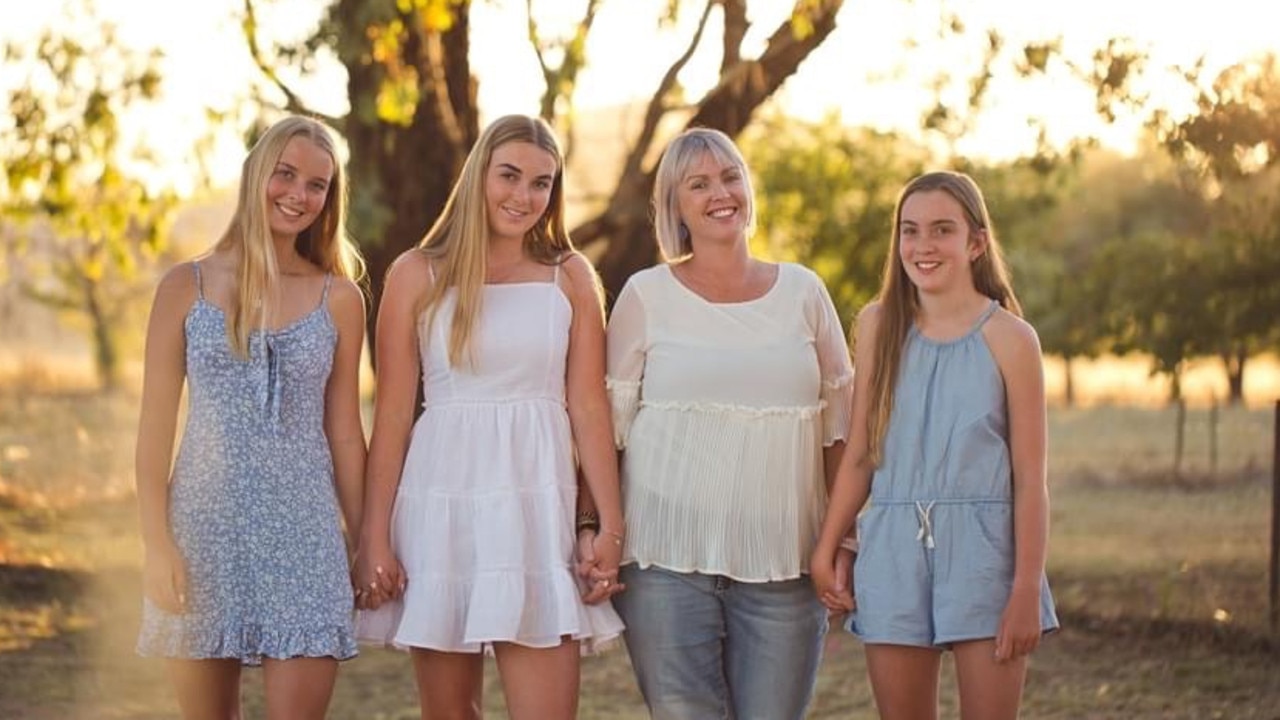
However the closeness of regional communities and their tight-knit nature can also prove a strength.
This year the town of Albury has shown out in force to support Pippa and Rose’s mission, with fundraising events including a community football game, movie night, school assembly and bike ride organised by the sisters. To date they have raised $15,000 for charity.
“It was good, very empowering to see everyone come together and support this cause,” says Rose Milthorpe. “They didn’t necessarily understand all about it at first, but they wanted to learn more and start the conversation.”
The sisters say that breaking down stigma and silence in a small community is another vital piece of the puzzle.
“People are coming up on the street and having a conversation asking how it is all going,” says Pippa.
“Even if people are not that close to us, people are coming up and asking about it. It’s definitely all positive. Everyone has been really supportive and wanting to know more.”
Join the fight
Now, with the help of news.com.au, the sister’s mission just got turbo charged with them asking everyone to sign their petition to roll out the program across NSW.
On Monday news.com.au launched its exclusive Justice Shouldn’t Hurt campaign and multiple experts and survivor advocates have lined up to join our call for action.
“It is an abomination that the Child Sexual Offence Evidence Program still hasn’t been rolled out beyond Sydney and Newcastle,” says Hayley Foster, CEO of Full Stop Australia.
“At the moment, less than 1.5 per cent of perpetrators are held to account in this country. We know what it takes to make court processes safer for sexual assault complainants and yet the most basic of protections still aren’t available for children across NSW, let alone adults.”
Megan Mitchell AM, the Former National Children’s Commissioner says that “while there are funds involved in setting up and expanding this pilot program, the benefits far outweigh the cost in terms of benefit to mental health, cohesion in the community, physical health, relationships, and overall benefit to young people.”
Saxon Mullins, a survivor advocate and director of Rape & Sexual Assault Research & Advocacy agrees.
“It shouldn’t be up to luck. Luck should have nothing to do with it. You shouldn’t be lucky to get a good detective, or an empathetic prosecutor, or a scarce place in a pilot program. These things should be standard.”
Nina Funnell is a Walkley Award winning journalist and sexual assault survivor advocate who has created the Justice Shouldn't Hurt Campaign in exclusive partnership with news.com.au.
Contact us: ninafunnell@gmail.com




